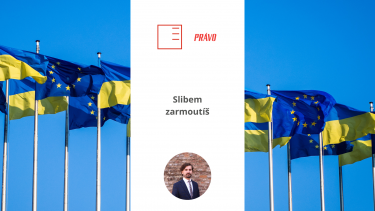Analysis | Gradual Integration Process: Towards Restoring Effectiveness And Credibility Of EU Enlargement
Discussions on further changes to the enlargement methodology may reinforce the image of EU membership as a moving target with constantly changing rules, especially as the current methodology has still not been fully applied. Within the framework of the current methodology, the European Commission should develop a new strategy that would specify its approach to the gradual integration of (potential) candidates into the EU and the conditions governing this process. The 2018 Western Balkans Strategy set out initiatives, some of which are still valid today and can serve as the basis for a new enlargement strategy. Writes Jana Juzová, Senior Research Fellow.
Show more PDF
Právo | A promise will dissapoint
Already last year, the EU-27 prime ministers granted Ukraine candidate status and the December summit is expected to approve the opening of accession talks. Our deputy director Viktor Danek reflected on the EU's promises and Ukraine's thorny path to membership in a piece for Právo.
Show moreINVITATION | EU Enlargement to the Western Balkans: 20 Years After the Thessaloniki Summit
We would like to invite you to the debate "EU Enlargement to the Western Balkans: 20 Years After the Thessaloniki Summit", which will take place on October 16th at 17:00 on the premises of the University of Economics in Prague in room NB 169 (Rectors´ Lounge). Address: Churchill 4, Prague 130 67.
Show moreSeznam zprávy | Will Ukraine join the EU in 2030? A consolation for Kyiv and a signal for Moscow
Talks on Ukraine's integration into the European Union are about to begin, and despite the proclamations, the date of entry cannot be set in advance. Žiga Faktor, head of the Brussels office of the EUROPEUM Institute, emphasized that the latest proclamations on Ukraine's EU membership reflect a shift in the approach of member countries to EU enlargement.
Show more
Report | From Vilnius and Beyond: Unraveling the Strategic Potential of NATO's Nordic and Central Eastern European Allies
Our Research Fellow Danielle Piatkiewicz co-edited a report made in partnership with the Global Policy Research Group. In an era marked by shifting geopolitical landscapes, the Nordic and Central/Eastern European countries hold key strategic positions within the North Atlantic Treaty Organization (NATO). Following the recently concluded NATO Summit in Vilnius, it's clear that the Alliance stands at a crossroads. The summit underscored the importance of member nations harmonizing their aspirations, capabilities, and strategic priorities. The report delves into both past and current policy initiatives to offer insights into the legacy of cooperation and strategic positioning of these nations.
Show moreBLOG | Does Türkiye play well-calculated chess moves on the Western board?
Nilsu Eledağ has written a blog about Türkiye's role in determining Sweden's NATO membership and concerns about terrorism and anti-Islamist movements. Türkiye took a slight turn in foreign policy and now plays a closer game with NATO allies. There could be two reasons behind why Türkiye chose to shift towards the West. Find out more in Eledağs blog.
Show moreBLOG | How can the EU boost the implementation of the Franco-German Proposal? A turning point for Kosovo-Serbia normalisation process
Serbia's refusal to recognise Kosovo, which unilaterally declared independence in 2008, is at the root of many problems within the region of Western Balkan. It hinders both countries’ EU membership paths, creates destabilisation in the Balkans, as visible in the recent unrest in northern Kosovo, and hinders regional economic cooperation. Writes our intern from our Brussel's office Costanza Celoria.
Show moreE15.cz: Czechs don't want czexit. Without the European Union, we would end up like Kaliningrad
Europeum, in cooperation with the analytical institute STEM, prepared a survey on the subject of the Czech Republic's membership in the EU and the adoption of the euro currency. For E15, researcher Klára Votavová and senior researcher Vít Havelka commented on the topic.
Show more
National Convention on the EU | Background material: Evaluation of the Czech Presidency of the Council of the EU
Our research associate Zuzana Kasáková and our senior researcher Vít Havelka prepared background material for the Round Table of the National Convention on the EU on the topic Evaluation of the Czech Presidency. Three main questions are put to the Round Table: How successful has the Czech Reublic been in implementing its Presidency priorities? How successful was the Czech Republik in carrying out its presidency in terms of organisation? Has the Czech Republic been successful in promoting its membership in the European Union?
Show more

POLICY PAPER | Demand the impossible: How Ukraine became a candidate for EU membership
Tomasz Żornaczuk writes that Russia's aggression in Ukraine has led to major changes in EU enlargement in 2022. The most significant of these was the change in the Union's geographical position after Ukraine and Moldova were granted EU candidate status and Georgia was granted the prospect of accession. The move seemed almost impossible a few weeks before it became the new political reality in June 2022.
Show moreStaroměstské náměstí 4/1
Prague 1 - Staré Město
110 00
tel.: +420 212 246 552
email: europeum@europeum.org
https://www.europeum.org









